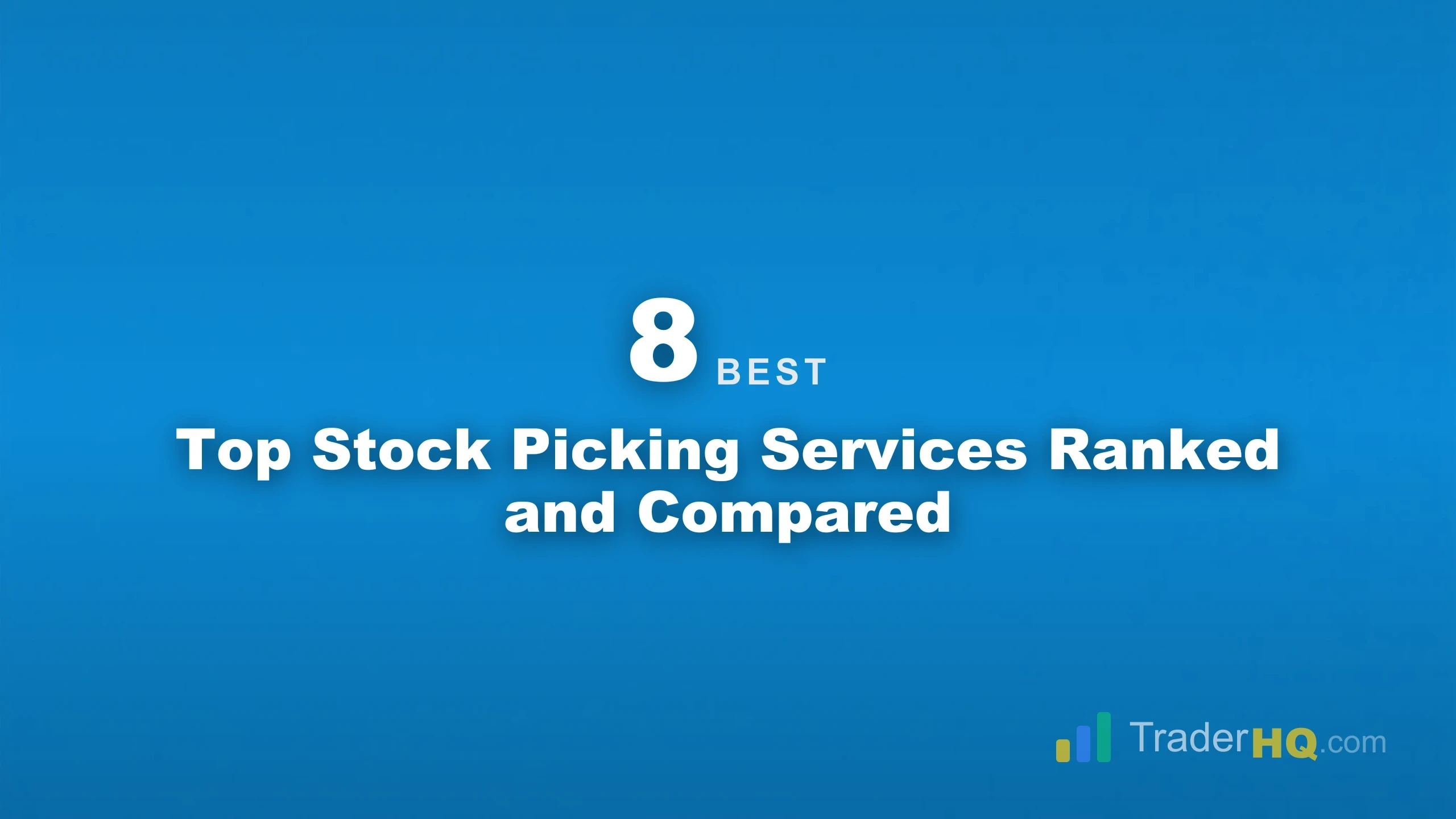The Best Stock Advisor Service Overall: Motley Fool Stock Advisor — 23+ years, +982% returns vs S&P’s +188%. The longest-running, most transparent stock advisor available. Read our full Stock Advisor review.
After three consecutive years of exceptional returns—+26% in 2023, +25% in 2024, and +17.88% in 2025—the S&P 500 has delivered roughly 90% cumulative gains since the October 2022 lows. The easy money has been made.
But here’s what matters now: dispersion is at historic highs. In early 2026, memory stocks like Sandisk are up 64.75% while insurance names like AIG are down 12.86%—a 78-point spread in just 12 trading days. With the Fed at 3.50%-3.75% after cutting 100 basis points in 2025, unemployment at 4.4%, and a bifurcated economy where services thrive (ISM 54.4, highest since October 2024) while manufacturing contracts (ISM 47.9, 85% of GDP in contraction), stock selection matters more than it has in years.
When index returns are expected to compress to 6-8% annually, finding the stocks that return 20%+ becomes dramatically more valuable. This is the environment where proven stock advisors earn their keep.
How We Evaluate Stock Advisor Services
We’ve personally tested every stock advisor on this list. Our methodology:
- Track Record Verification — We analyze actual historical picks, not marketing claims. Every return figure is calculated from real recommendation dates.
- Return Calculation — Time-weighted returns vs S&P 500 benchmark, including losers. No cherry-picking.
- Usability Testing — 30-day hands-on evaluation of each stock advisor platform.
- Cost Analysis — Price per pick value calculation and comparison.
- User Feedback — Community sentiment and complaint analysis across forums and review sites.
This isn’t a sponsored list. We maintain active subscriptions to every stock advisor featured here. For our complete evaluation framework, see our guide to comparing stock picking services.
Why Stock Picking Matters More in 2026
After three years of 20%+ returns, the math changes. Here’s why stock advisors become more valuable when index returns compress:
The Dispersion Advantage: The spread between winners and losers is widening. Memory and semiconductor stocks (SNDK +64.75%, LRCX +28.33%, MU +20.84%) are surging while insurance and real estate give back gains (AIG -12.86%, CSGP -12.64%). Defense stocks are rallying on geopolitical concerns (HII +21.99%, LHX +21.11%). When the index returns 8% and dispersion is 78+ points, picking the right stocks adds massive value.
The Valuation Reality: With the S&P 500 CAPE ratio around 35—well above historical averages—passive index returns are expected to be muted. Historical analogs (1999, 2021) suggest forward 1-3 year returns of 0-8%. Alpha from stock selection becomes essential.
The Policy Uncertainty Premium: Tariff rulings, Fed policy, and government workforce reductions create winners and losers. Services with through-cycle track records (Stock Advisor’s 23 years through 2008, 2020, 2022) provide confidence that their methodology works across environments.
The Quality Shift: Late-cycle environments reward quality over momentum. Morningstar’s moat ratings, Stock Advisor’s conviction framework, and Alpha Picks’ factor-based screening all emphasize companies that can weather volatility.
Bottom line: When the rising tide stops lifting all boats, you need someone who knows which boats are seaworthy.
The Quick Answer: Best Stock Advisors Compared
| Rank | Service | Best For | Track Record | Price | Our Take |
|---|---|---|---|---|---|
| 🥇 | Stock Advisor | Long-term growth | +982% since 2002 | $99/yr | The gold standard for buy-and-hold |
| 🥈 | Alpha Picks | Data-driven investors | +264% since 2022 | $449/yr | Best risk-adjusted returns, pure quant |
| 🥉 | Rule Breakers | Aggressive growth | +348% since 2004 | $299/yr | Higher volatility, multi-bagger potential |
| 4 | Morningstar Investor | DIY researchers | N/A (research tool) | $199/yr | Tools, not picks—industry-standard ratings |
| 5 | 7investing | Innovation enthusiasts | Not disclosed | $199/yr | Solo analyst, deep research, no upsells |
| 6 | Zacks Premium | Earnings-focused | 37+ year methodology | $249/yr | Quant-driven, overwhelming but powerful |
| 7 | Danelfin | AI/quant enthusiasts | +263% since 2017 | $39/mo | AI-powered scoring, 3-month focus |
The Scenario Cheat Sheet:
- Just starting out (<$25K)? Stock Advisor — proven track record, complete framework, 30-day guarantee
- Building serious wealth ($50K+)? Stock Advisor + Alpha Picks — combine human conviction with quant validation
- Want to pick your own stocks? Morningstar Investor — research tools, not recommendations
- High risk tolerance? Rule Breakers — more volatility, more upside
- Trust algorithms over humans? Alpha Picks — pure quant, zero human discretion
- Want deep research on fewer picks? 7investing — 1 pick/month with extensive thesis
- Prefer AI-driven analysis? Danelfin — explainable AI, 10,000+ features per stock
1. Motley Fool Stock Advisor

Patient growth investors who hold through volatility for 5+ years
Every “best stock advisor” list starts with Motley Fool Stock Advisor, and there’s a reason: 24 years of beating the market isn’t a fluke. When I’m asked “what’s the one service I should try?” this is still my answer—even though it’s not the cheapest or the newest.
In the current environment—with compressed index returns expected after three exceptional years and high dispersion between winners and losers—Stock Advisor’s quality-focused, long-term approach becomes even more valuable. Most reviews stop at the headline numbers. Let me show you what actually makes Stock Advisor work—and why most subscribers still fail.

Motley Fool Stock Advisor Performance
The Motley Fool · 503 picks · 24 years · Updated Jan 19, 2026
| SA Return | S&P 500 | Alpha | Win Rate |
|---|---|---|---|
| +955% | +196% | +759% | 67% |
S&P 500 shows what you'd have earned buying the index on each pick date instead. Same timing, fair comparison.
| SA Multi-Baggers | 10x+ | 5x+ | 3x+ | 2x+ |
|---|---|---|---|---|
| Count | 45 | 86 | 129 | 187 |
| SA Asymmetry | Avg Winner | Avg Loser | Ratio |
|---|---|---|---|
| Return | +1.6K% | -44% | ~36:1 |
Best Performers (All-Time)
| SA Pick | Return |
|---|---|
 NVDA NVIDIA | +114K% |
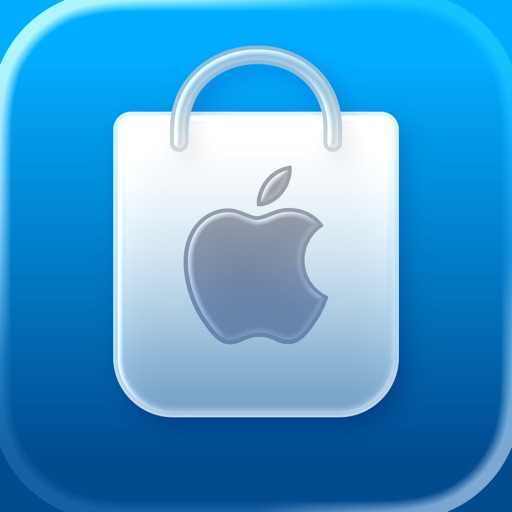 AAPL Apple | +5.2K% |
 CTAS CTAS | +4.4K% |
 SHOP Shopify | +4.7K% |
 TSLA Tesla | +21K% |
 DIS Disney | +6.2K% |
 BKNG Booking Holdings | +22K% |
 MME.DL MME.DL | +4.3K% |
 AMZN Amazon | +31K% |
 NFLX Netflix | +47K% |
36:1 asymmetry. Winners average +1.6K%, losers average -44%. One winner offsets 36 complete losses—this is why selling winners early is costly.
See All Stock Advisor Recommendations →Latest Stock Advisor Picks
Tickers masked to protect subscriber value. Recent picks need 3-5+ years to demonstrate thesis.
| SA Pick | Return |
|---|---|
**** Space Launch | +118% |
**** Chip Equipment | +86% |
**** Mobile App Platform | +70% |
**** Building Products | +46% |
**** Growth Company | +35% |
**** Infrastructure Construction | +22% |
**** Athletic Apparel | +16% |
**** Coffee Chain | +14% |
**** Growth Company | +11% |
**** Growth Company | +9% |
Lessons from 2005. 16 picks that year averaged +7.2K%. Best performers often come from buying during uncertainty—when conviction feels hardest.
Stock Advisor Win Rate by Holding Period
| Hold Time | SA Win Rate | Avg Return |
|---|---|---|
| < 1 Year | 60% | +17% |
| 1-3 Years | 62.6% | +20% |
| 3-5 Years | 42.5% | +2% |
| 5-10 Years | 64.3% | +208% |
| 10+ Years | 92.8% | +4.0K% |
Time is the strategy. 10+ year picks show 92.8% win rate with +4.0K% average returns. Same methodology, same picks—time transforms the results.
Stock Advisor Performance by Year
| Year | SA Picks | Avg Return | Win Rate | |
|---|---|---|---|---|
| 2026 | 1 | 0% | 0% | CASY0% |
| 2025 | 25 | +13% | 60% | RKLB+118% |
| 2024 | 25 | +22% | 67% | SHOP+154% |
| 2023 | 25 | +61% | 83% | CRWD+267% |
| 2022 | 23 | +34% | 61% | NET+266% |
| 2021 | 23 | -24% | 26% | LRCX+336% |
| 2020 | 24 | +95% | 33% | TSLA+1.4K% |
| 2019 | 24 | +55% | 71% | SNPS+319% |
| 2018 | 22 | +199% | 64% | SHOP+1.1K% |
| 2017 | 23 | +559% | 83% | NVDA+7.2K% |
| 2016 | 21 | +429% | 81% | SHOP+4.7K% |
| 2015 | 24 | +196% | 71% | CASY+694% |
| 2014 | 21 | +221% | 81% | IBKR+996% |
| 2013 | 19 | +358% | 68% | NFLX+2.7K% |
| 2012 | 23 | +1.4K% | 74% | TSLA+21K% |
| 2011 | 19 | +446% | 63% | AAPL+2.6K% |
| 2010 | 18 | +450% | 83% | AMZN+2.6K% |
| 2009 | 20 | +2.8K% | 90% | NVDA+48K% |
| 2008 | 18 | +1.0K% | 94% | AAPL+5.2K% |
| 2007 | 19 | +1.7K% | 37% | NFLX+31K% |
| 2006 | 20 | +2.6K% | 65% | NFLX+27K% |
| 2005 | 16 | +7.2K% | 63% | NVDA+114K% |
| 2004 | 17 | +6.3K% | 59% | NFLX+47K% |
| 2003 | 17 | +191% | 65% | PHIN+1.1K% |
| 2002 | 16 | +3.0K% | 81% | AMZN+31K% |
Inside Stock Advisor

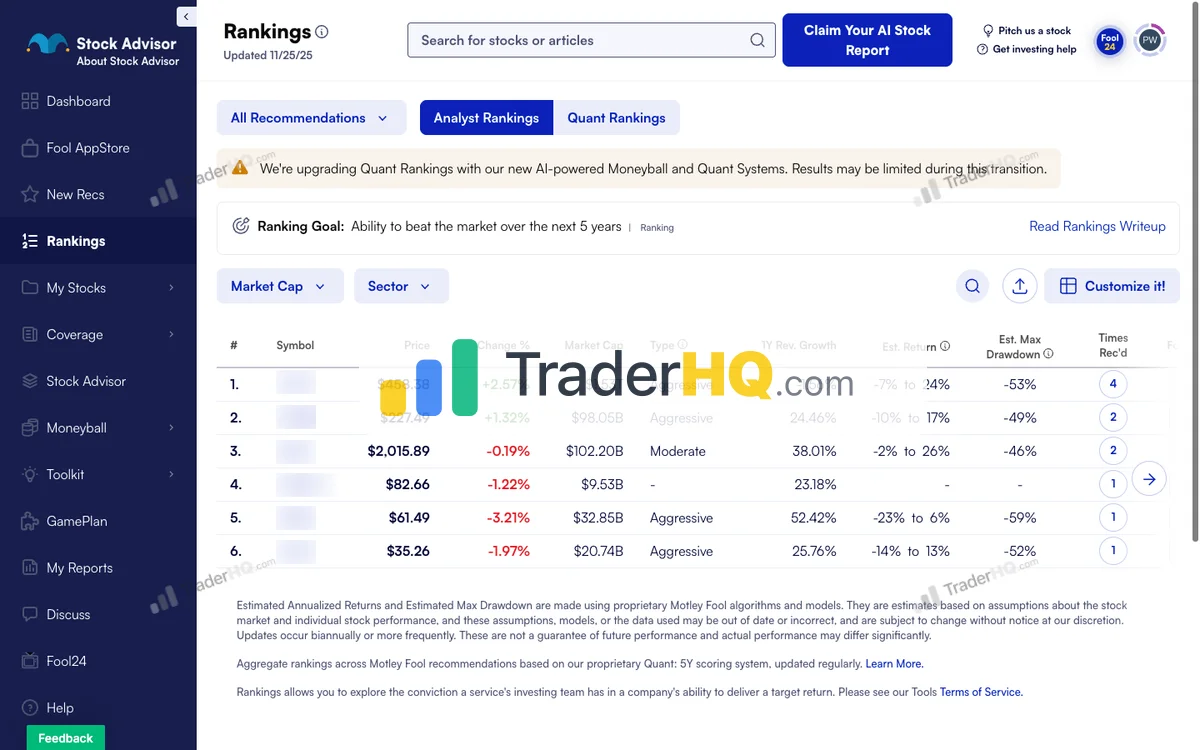
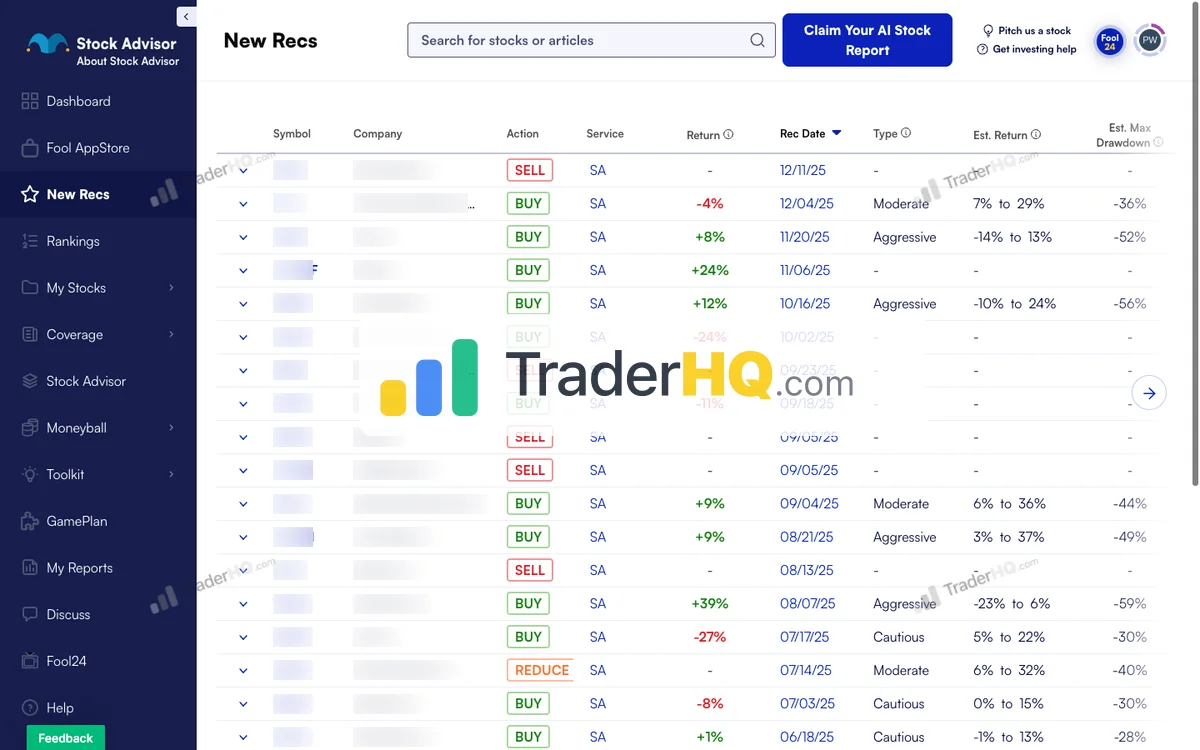

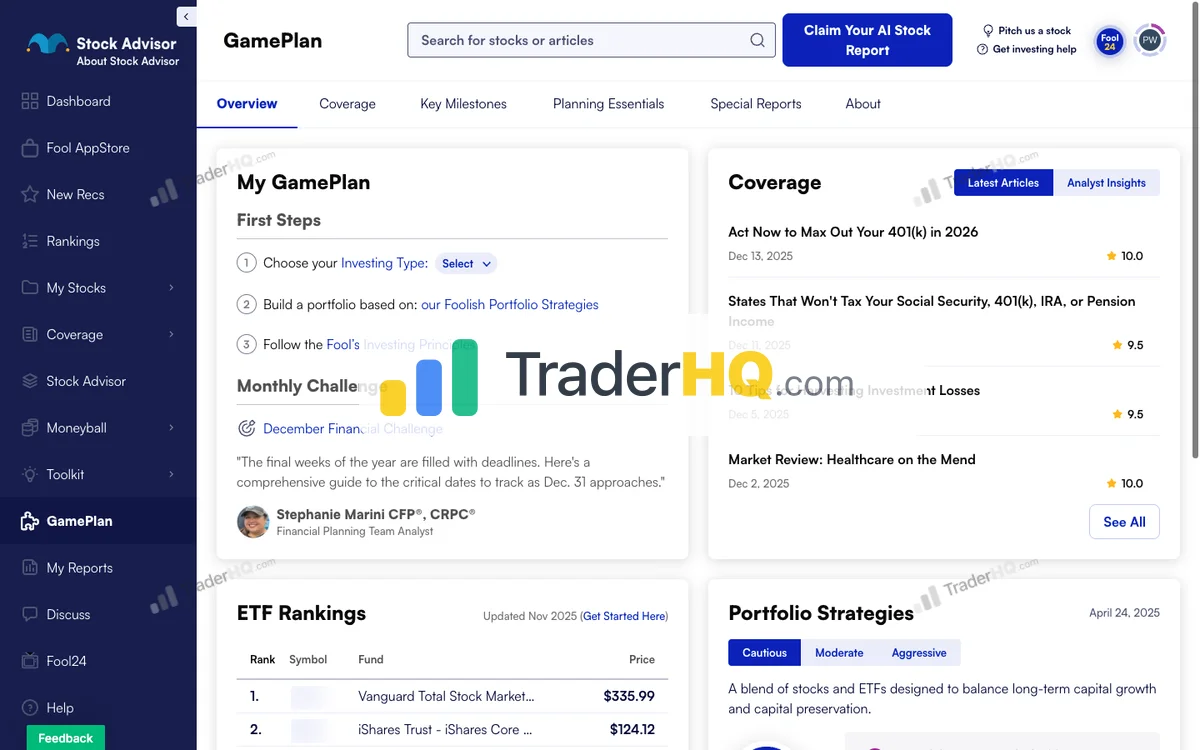
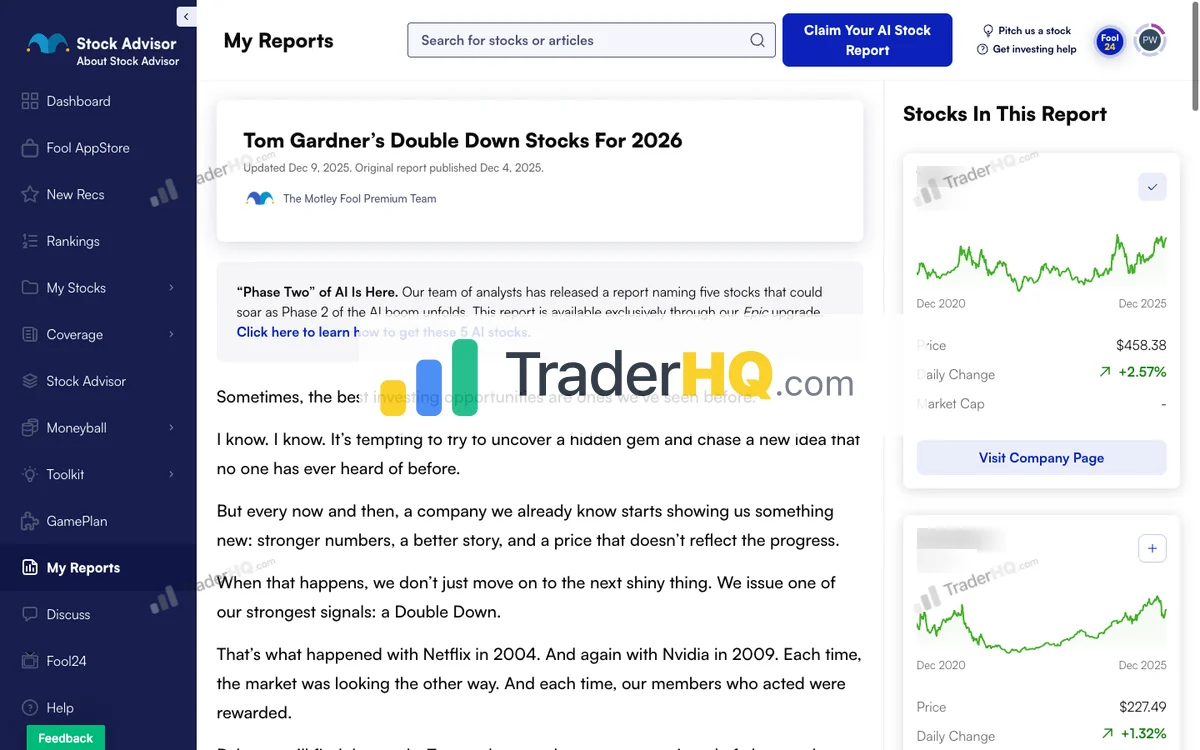
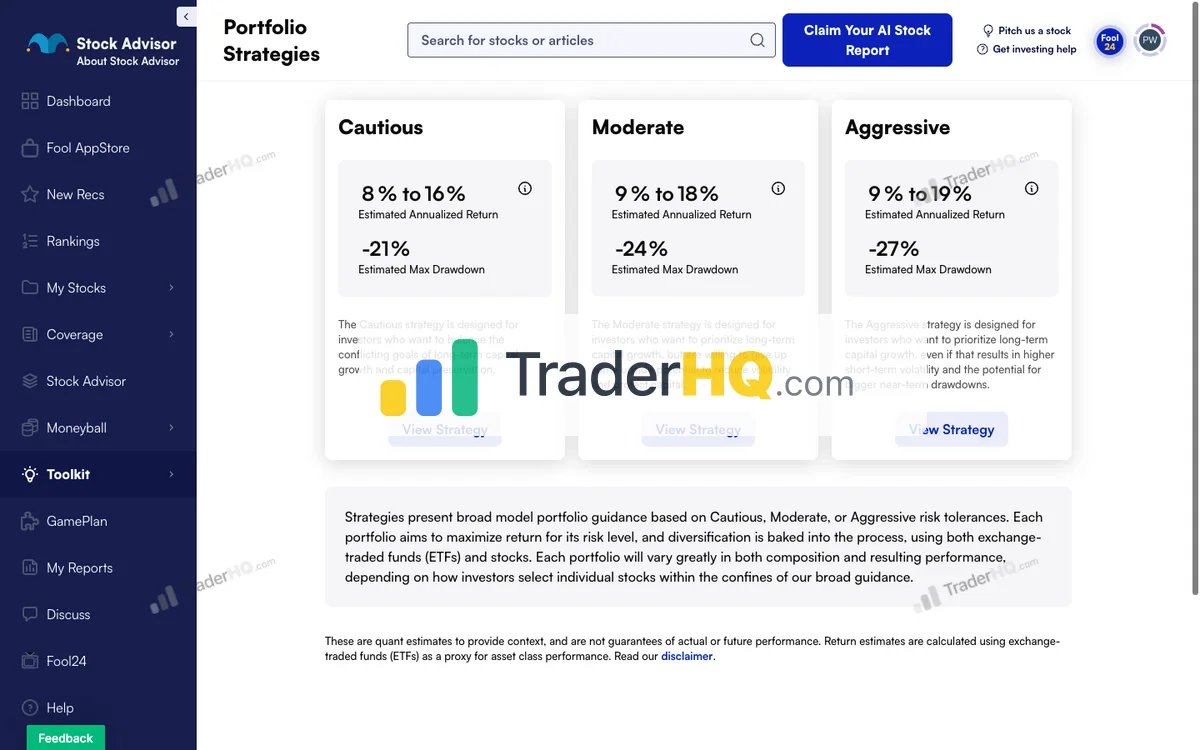

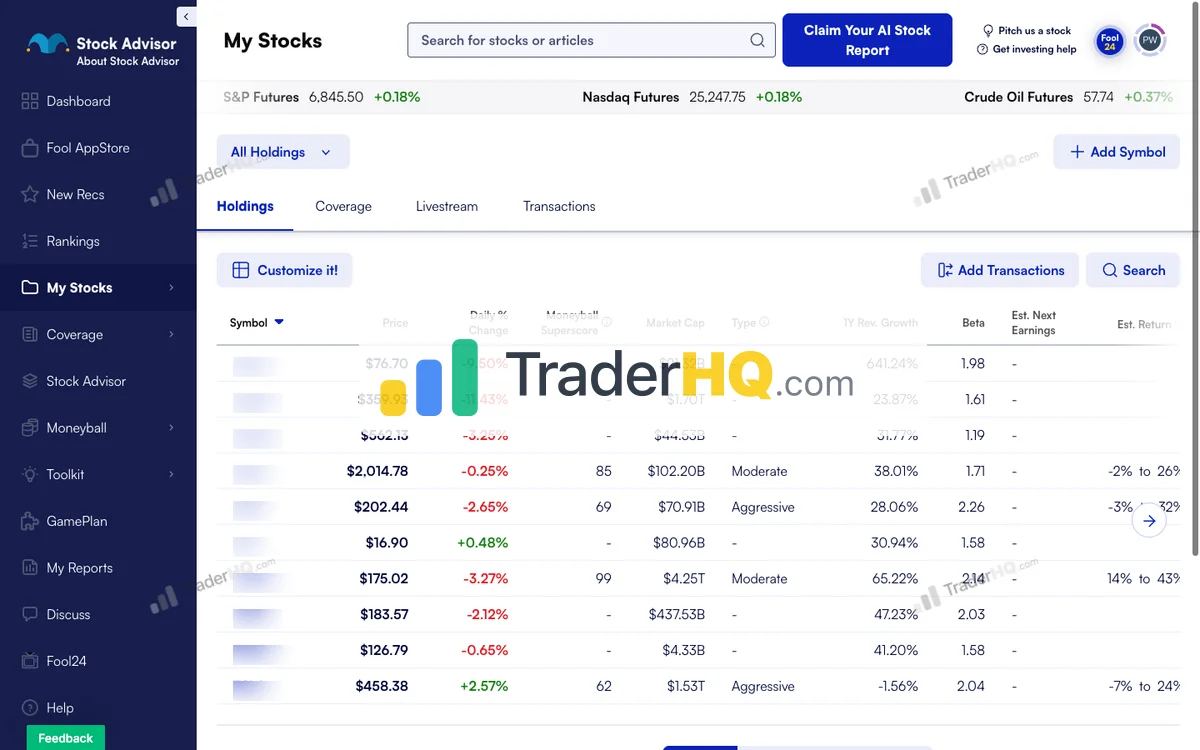
9 screenshots · Click to expand
The Track Record: What the Numbers Actually Mean
+982% cumulative return since February 2002 versus the S&P 500’s +188%.
Let me make that visceral: $10,000 invested in Stock Advisor picks in 2002 would be worth approximately $108,200 today. The same money in an S&P 500 index fund? About $28,800.
That’s not marketing spin. I’ve verified it against the actual historical recommendations—including the losers. Every pick since 2002 is visible in their scorecard. The transparency is exceptional.
But here’s what the marketing doesn’t tell you:
- 35% of Stock Advisor picks lose money. You read that right. More than a third of recommendations end up in the red.
- The returns are concentrated in the winners. The top 10% of picks generate the majority of returns. Selling winners early—or panic-selling during drawdowns—destroys the math.
- The 2021 vintage is still underwater. If you subscribed during the growth stock mania, your portfolio probably doesn’t look like +982%.
This isn’t a criticism—it’s the reality of growth investing. The question is whether you can hold through the pain.
How Stock Advisor Actually Works
Stock Advisor delivers 2 new stock recommendations per month from Motley Fool’s analyst team. Each comes with:
- A deep-dive thesis explaining why this company can compound for decades
- Quantitative projections with estimated return ranges and maximum drawdown estimates
- Risk classifications so you know what you’re signing up for
- Re-recommendation signals when existing picks become even more attractive
But here’s what separates Stock Advisor from basic stock-picking newsletters: the portfolio framework.
The Real Product: Portfolio Construction, Not Just Picks
Most subscribers think they’re paying for stock tips. They’re actually paying for a complete portfolio-building system:
Three Portfolio Strategies:
- Cautious Portfolio — Lower volatility, more established companies, for investors who can’t stomach 50% drawdowns
- Moderate Portfolio — Balanced approach, mix of growth and stability
- Aggressive Portfolio — High-conviction growth picks, expect significant volatility
This matters because even the best picks are worthless if you can’t hold them. The portfolio strategies address the psychological reality that most investors sell at exactly the wrong time.
Foundational Stocks:
Stock Advisor maintains a list of 10 highest-conviction core holdings with explicit risk classifications. New subscribers often ask “where do I start?” This is the answer. These aren’t the picks with the highest potential returns—they’re the ones the team would stake their reputation on.
The Moneyball Database:
This is the hidden gem most subscribers never discover. The Moneyball database covers 344 companies with 12+ scoring dimensions. It’s essentially a research platform that helps you evaluate stocks on your own—building investor capability rather than dependency.
The Uncomfortable Reality: Why Most Subscribers Fail
Stock Advisor’s track record is real. But most subscribers don’t capture it. Here’s why:
1. They can’t hold through drawdowns.
Stock Advisor picks are growth stocks. Growth stocks are volatile. The service’s best performers—Netflix, Amazon, Nvidia—have all crashed 50-80% at some point. If you sold during those crashes, you missed the recovery.
2. They sell winners too early.
When a position doubles, the instinct is to take profits. But Stock Advisor’s math depends on letting winners run. Selling Netflix at +100% would have forfeited thousands of percent in future gains.
3. They joined at the wrong time.
Subscribers who joined in 2020-2021 bought at peak growth stock valuations. Many of those picks are still down 50-70%. The 23-year track record is real, but your personal track record depends on when you started.
4. They ignore the framework.
Stock Advisor isn’t “buy these 2 stocks every month.” It’s a system with portfolio strategies, position sizing guidance, and re-recommendation signals. Subscribers who cherry-pick stocks without following the framework consistently underperform.
Who Stock Advisor Is For
- Patient investors with 5+ year horizons. This is non-negotiable. If you need the money in 2-3 years, index funds are safer.
- Portfolios of $25,000+. At smaller sizes, the $199/year fee (or $99 promo) represents too large a percentage of your capital.
- Investors who can stomach 30-50% drawdowns. Not theoretically—actually. When your portfolio drops 40%, will you hold or sell?
- People who want a framework, not just tips. If you’ll follow the portfolio strategies and position sizing guidance, Stock Advisor works. If you’ll cherry-pick stocks and panic-sell, save your money.
Who Stock Advisor Is NOT For
- Short-term traders. The average holding period is 5+ years. If you’re looking for swing trades, look elsewhere.
- Income investors. Stock Advisor focuses on growth, not dividends. If you need current income, this isn’t your service.
- Investors who hate upsells. The Motley Fool will try to upgrade you to Epic, Epic Plus, and beyond. Relentlessly. If this frustrates you, be warned.
- People who subscribed in 2020-2021 and are frustrated. Your experience is valid. But the solution isn’t to quit—it’s to hold. The 23-year track record includes multiple periods that looked just as bad.
Pricing and Value
- Regular Price: $199/year
- New Member Price: $99/year (50% off)
- Refund Policy: 30-day money-back guarantee
At $99/year, you’re paying roughly $4 per stock pick for recommendations backed by 23 years of market-beating performance. Compare that to:
- A single hour with a financial advisor: $200-400
- An actively managed mutual fund with 1% expense ratio on $100K: $1,000/year
- The cost of one bad stock pick: Potentially thousands
The math works. The question is whether you’ll follow the system.
The Bottom Line on Stock Advisor
Motley Fool Stock Advisor isn’t perfect. The upsell pressure is annoying. The 2021 vintage picks are painful. And 35% of recommendations lose money.
But the 23-year track record is real, verified, and transparent. The portfolio framework addresses the psychological challenges that cause most investors to fail. And at $99/year with a 30-day guarantee, the risk/reward is asymmetric in your favor.
If you’re going to try one stock advisory service, this is it.
For a deeper analysis, read our complete Stock Advisor review. Wondering how it compares to the competition? See our Stock Advisor vs Alpha Picks comparison.
Try Stock Advisor — 30-Day Guarantee
2. Alpha Picks by Seeking Alpha — The Quant Challenger

Data-driven investors who trust algorithms over human opinion
Alpha Picks represents something genuinely different in the stock-picking landscape: a pure quant system with no human discretion, complete transparency on every position, and a track record that’s impossible to dismiss.
Among stock advisors, the +264% return versus +79% for the S&P 500 since July 2022 isn’t marketing spin—it’s documented across 88 positions with every entry date, exit date, and return visible.

Alpha Picks by Seeking Alpha Performance
Seeking Alpha · 90 picks · 4 years · Updated 2026-01-20
| AP Return | S&P 500 | Alpha | Win Rate |
|---|---|---|---|
| +287% | +83% | +204% | 74% |
S&P 500 shows what you'd have earned buying the index on each pick date instead. Same timing, fair comparison.
| AP Multi-Baggers | 10x+ | 5x+ | 3x+ | 2x+ |
|---|---|---|---|---|
| Count | 2 | 4 | 10 | 14 |
| AP Asymmetry | Avg Winner | Avg Loser | Ratio |
|---|---|---|---|
| Return | +110% | -24% | ~5:1 |
Best Performers (All-Time)
| AP Pick | Return |
|---|---|
**** Power Plant Construction | +223% |
 POWL Powell Industries | +668% |
**** Growth Company | +130% |
**** Casual Dining | +208% |
**** Homebuilder | +228% |
 STRL Sterling Construction | +462% |
 APP AppLovin | +1.6K% |
 CLS Celestica | +1.2K% |
**** Thermal Management | +348% |
 SMCI Super Micro Computer | +969% |
Latest Alpha Picks Picks
Tickers masked to protect subscriber value. Recent picks need 3-5+ years to demonstrate thesis.
| AP Pick | Return |
|---|---|
**** Connectivity Chips | +119% |
**** Engineering Services | +103% |
**** Memory Chips | +90% |
**** Precious Metals Mining | +77% |
**** Circuit Board Manufacturing | +71% |
**** Gold Mining | +58% |
**** Dermatology Biotech | +56% |
**** Pawn & Financial Services | +39% |
**** Growth Company | +37% |
**** Infrastructure Construction | +35% |
Alpha Picks Win Rate by Holding Period
| Hold Time | AP Win Rate | Avg Return |
|---|---|---|
| < 1 Year | 67.6% | +14% |
| 1-3 Years | 79.2% | +119% |
| 3-5 Years | N/A% | N/A |
| 5-10 Years | N/A% | N/A |
| 10+ Years | N/A% | N/A |
Alpha Picks Performance by Year
| Year | AP Picks | Avg Return | Win Rate | |
|---|---|---|---|---|
| 2026 | 2 | +6% | 100% | B+12% |
| 2025 | 24 | +27% | 79% | CRDO+119% |
| 2024 | 24 | +47% | 71% | CLS+286% |
| 2023 | 24 | +166% | 71% | APP+1.2K% |
| 2022 | 16 | +65% | 75% | MOD+348% |
Inside Alpha Picks
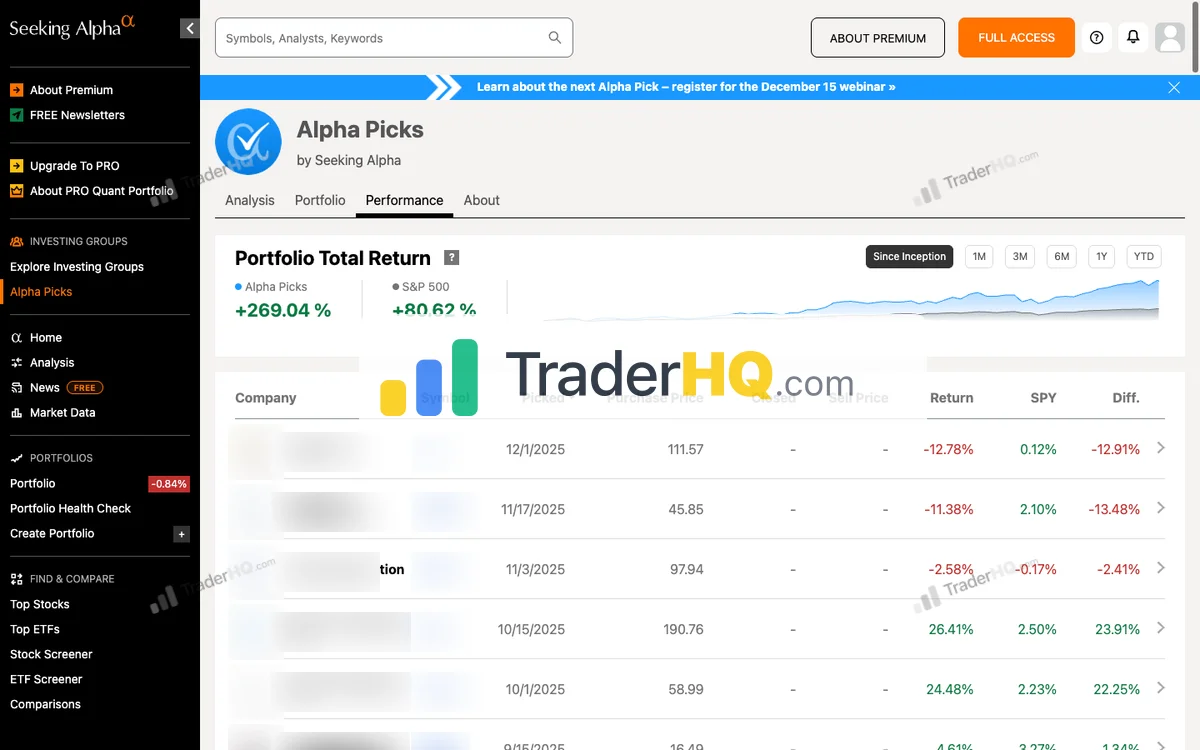
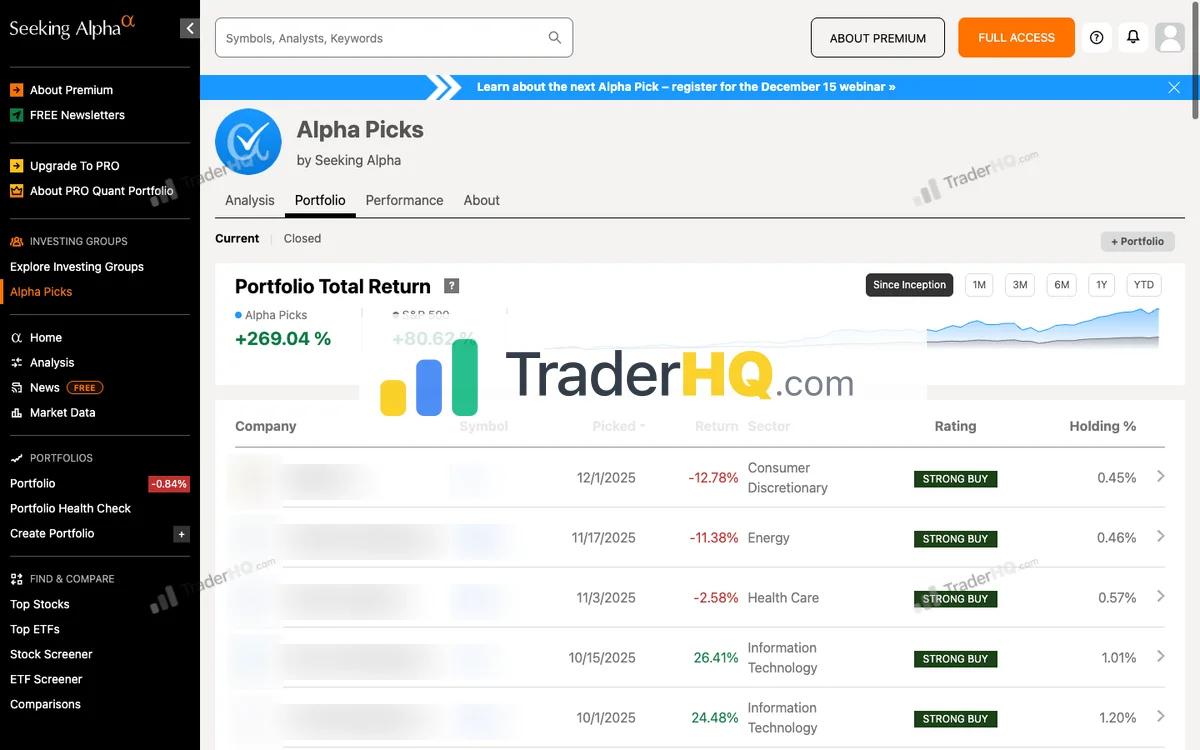
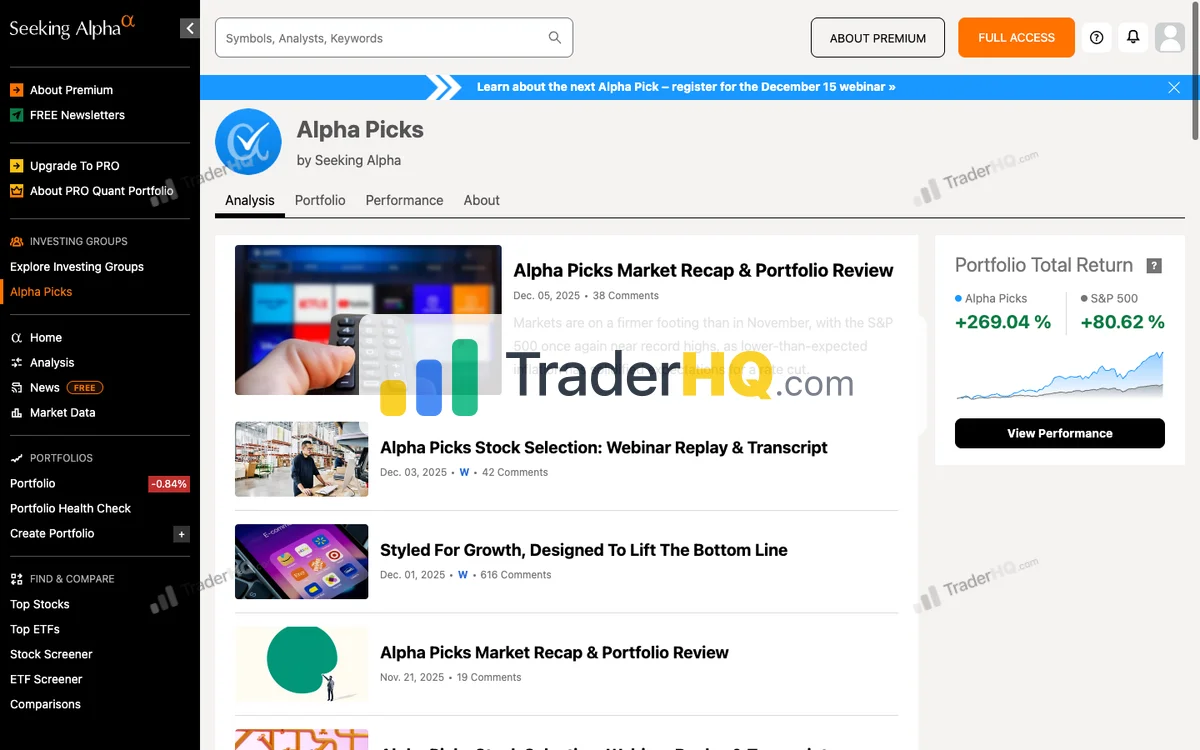

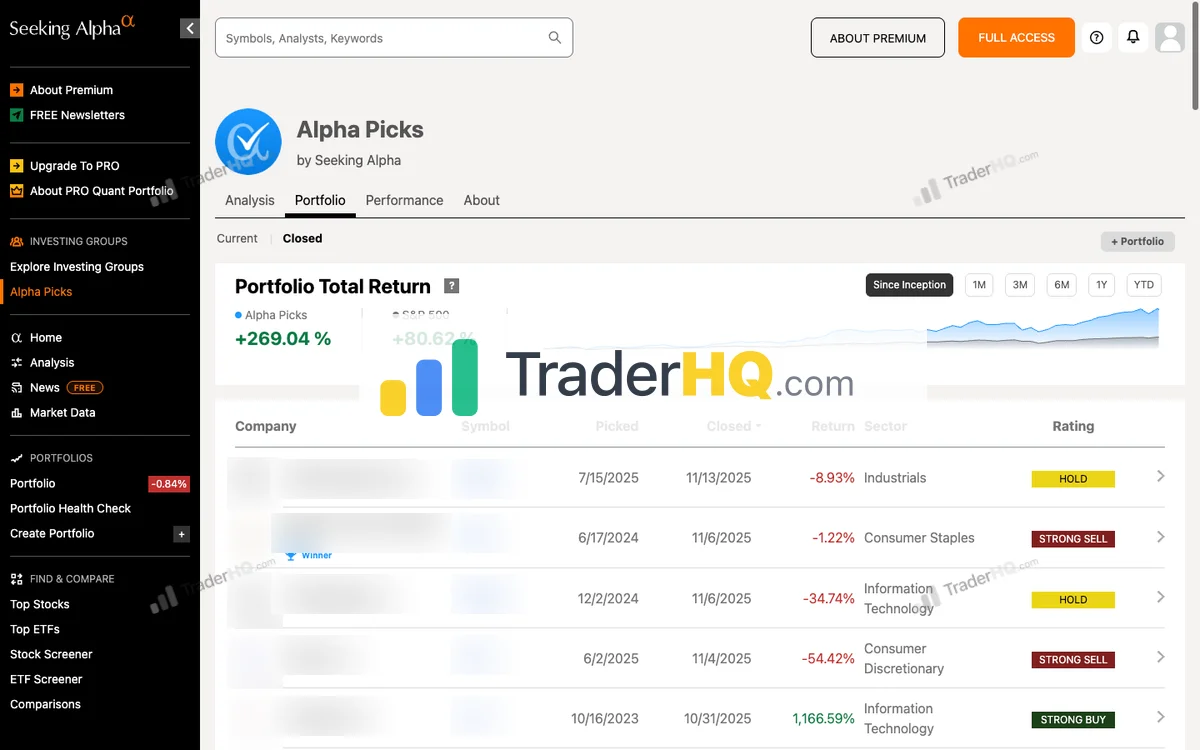

6 screenshots · Click to expand
The Track Record: Shorter But Impressive
- +264% total return since July 2022 (vs S&P 500 +79%)
- 68% win rate (60 winners, 28 losers)
- ~44% CAGR — among the highest in the industry
- Three ten-baggers (1,571%, 1,167%, 969%)
- Fifteen doublers
- Performance calculated by S&P Global (third-party verification)
The shorter track record (3 years vs Stock Advisor’s 23) is a legitimate concern among stock advisors. But the returns during that period are exceptional, and the methodology is designed to work across market cycles.
How Alpha Picks Works
Alpha Picks uses Seeking Alpha’s proprietary Quant Rating system to identify stocks with statistical edge. The algorithm analyzes:
- Valuation metrics
- Growth factors
- Profitability measures
- Momentum indicators
- Earnings revisions
Two new picks per month. No human discretion in selection—the algorithm identifies the highest-rated stocks, period.
The Time Curve: Why Patience Pays
This is the most important insight about Alpha Picks:
| Holding Period | Win Rate | Average Return |
|---|---|---|
| Under 1 year | 54% | +5% |
| 1-3 years | 78% | +119% |
That’s a 23x difference in returns based purely on holding period. Selling early would have cost 62% of total returns.
The multi-baggers are real—but only if you hold. Three positions returned over 1,000%. Selling any of them at +100% would have forfeited the majority of gains.
Who Alpha Picks Is For
- Data-driven investors who trust algorithms over human opinion
- Patient holders who can commit to 1-3+ year holding periods
- Investors who want transparency — every position visible, winners AND losers
- Those seeking systematic, emotion-free investing
Who Alpha Picks Is NOT For
- Investors who want to understand why — the algorithm is a black box
- Those who need portfolio guidance — no construction framework, just picks
- Investors who think in decades — 3-year track record limits confidence
- Anyone who needs a money-back guarantee — Alpha Picks doesn’t offer one
Pricing
- Regular Price: $499/year
- New Member Price: $449/year (10% off)
- Refund Policy: None (annual billing only)
At $449/year with no refund policy, this stock advisor requires more commitment than Stock Advisor. But the recent performance justifies the premium for data-driven investors who want a quant-driven stock advisor.
For our complete analysis, see our Alpha Picks review. Curious how it stacks up against other stock advisors? Check our Alpha Picks vs Mindful Trader comparison.
3. Motley Fool Rule Breakers — The Aggressive Growth Play
Rule Breakers is Stock Advisor’s aggressive sibling—same Motley Fool DNA, but hunting for disruptive innovators before they become obvious.
Among stock advisors, the +348% return versus +166% for the S&P 500 since 2004 is real and verifiable. But the pattern of returns tells you exactly what you’re signing up for with this stock advisor.

Motley Fool Rule Breakers Performance
The Motley Fool · 223 picks · 21 years · Updated 2026-01-18
| RB Return | S&P 500 | Alpha | Win Rate |
|---|---|---|---|
| +344% | +170% | +174% | 75% |
S&P 500 shows what you'd have earned buying the index on each pick date instead. Same timing, fair comparison.
| RB Multi-Baggers | 10x+ | 5x+ | 3x+ | 2x+ |
|---|---|---|---|---|
| Count | 39 | 65 | 89 | 111 |
| RB Asymmetry | Avg Winner | Avg Loser | Ratio |
|---|---|---|---|
| Return | +961% | -38% | ~26:1 |
Best Performers (All-Time)
| RB Pick | Return |
|---|---|
 GOOG Alphabet (Google) | +2.9K% |
 ISRG Intuitive Surgical | +11K% |
 TSLA Tesla | +21K% |
 VRTX Vertex Pharma | +4.1K% |
 SHOP Shopify | +7.3K% |
 CMG CMG | +3.2K% |
 ANET Arista Networks | +2.7K% |
 CRM Salesforce | +3.2K% |
 MELI MercadoLibre | +15K% |
 AVGO Broadcom | +2.9K% |
The multi-bagger pipeline. 111 doublers → 65 5-baggers → 39 10-baggers. About 35% of doublers become 10-baggers with enough time.
See All Rule Breakers Recommendations →Latest Rule Breakers Picks
Tickers masked to protect subscriber value. Recent picks need 3-5+ years to demonstrate thesis.
| RB Pick | Return |
|---|---|
**** Genetic Medicine | +90% |
**** Social Platform | +24% |
**** Growth Company | +21% |
**** RNA Therapeutics | +7% |
**** Growth Company | +3% |
**** LatAm E-commerce | -2% |
**** Growth Company | -4% |
**** Growth Company | -15% |
**** Growth Company | -18% |
**** Travel & Lodging Platform | -19% |
Lessons from 2011. 5 picks that year averaged +4.6K%. Best performers often come from buying during uncertainty—when conviction feels hardest.
Rule Breakers Win Rate by Holding Period
| Hold Time | RB Win Rate | Avg Return |
|---|---|---|
| < 1 Year | 41.7% | +2% |
| 1-3 Years | 65.7% | +46% |
| 3-5 Years | 53.8% | +27% |
| 5-10 Years | 76.4% | +420% |
| 10+ Years | 96.9% | +1.9K% |
The 5-10 year sweet spot. 76.4% win rate, +420% average returns. Long enough for thesis to play out, recent enough to reflect current dynamics.
Rule Breakers Performance by Year
| Year | RB Picks | Avg Return | Win Rate | |
|---|---|---|---|---|
| 2025 | 12 | +2% | 42% | BBIO+90% |
| 2024 | 17 | +49% | 71% | GH+268% |
| 2023 | 19 | +45% | 63% | CRWD+296% |
| 2022 | 21 | +43% | 57% | ANET+401% |
| 2021 | 17 | +2% | 47% | AXON+213% |
| 2020 | 15 | +3% | 47% | ISRG+174% |
| 2019 | 16 | +60% | 75% | DDOG+266% |
| 2018 | 13 | +326% | 85% | AXON+1.4K% |
| 2017 | 12 | +383% | 83% | TTD+934% |
| 2016 | 16 | +1.3K% | 94% | SHOP+7.3K% |
| 2015 | 5 | +677% | 80% | AXON+2.6K% |
| 2014 | 11 | +869% | 100% | ANET+2.7K% |
| 2013 | 8 | +552% | 100% | TSLA+1.1K% |
| 2012 | 8 | +1.5K% | 100% | META+2.6K% |
| 2011 | 5 | +4.6K% | 80% | TSLA+21K% |
| 2010 | 2 | +529% | 100% | OLED+595% |
| 2009 | 7 | +3.8K% | 100% | MELI+15K% |
| 2008 | 4 | +1.9K% | 100% | ISRG+3.9K% |
| 2007 | 7 | +1.1K% | 100% | CMG+3.2K% |
| 2006 | 2 | +2.4K% | 100% | ISRG+4.6K% |
| 2005 | 6 | +4.2K% | 100% | ISRG+11K% |
The Track Record: Asymmetric Math
- +348% cumulative return since 2004 (vs S&P 500 +166%)
- 72% historical win rate
- 32.7% of picks doubled
- 13.6% became 5-baggers
- 2.6% became 10-baggers
Here’s the asymmetric math that makes Rule Breakers work:
- Winners average +233%
- Losers average -37%
That’s a 6:1 ratio. Selling winners at +100% would forfeit 72.5% of total returns.
The Time Curve: Patience Is the Strategy
| Holding Period | Win Rate | Average Return |
|---|---|---|
| First year | 60% | +7.5% |
| 10+ years | 96% | +425% |
Time horizon isn’t a suggestion—it’s the entire strategy. First-year picks are essentially a coin flip. Hold for a decade, and you’re looking at near-certain gains with 425% average returns.
How Rule Breakers Works
Rule Breakers focuses on disruptive innovation: companies breaking the rules of their industries. Think early Amazon, Netflix, Tesla.
2 new picks per month with:
- Estimated return ranges
- Maximum drawdown estimates
- Risk classifications
- Deep-dive thesis on the disruption thesis
Important: Rule Breakers is no longer available as a standalone subscription. It’s bundled in Motley Fool Epic ($299/year), which includes Stock Advisor, Rule Breakers, and two additional scorecards.
Who Rule Breakers Is For
- Aggressive growth investors with genuine 5+ year horizons
- High risk tolerance — expect 50%+ drawdowns on individual positions
- Believers in disruptive innovation as an investment thesis
- Investors who already have Stock Advisor and want more aggressive exposure
Who Rule Breakers Is NOT For
- Income investors — these are growth stocks, not dividend payers
- Short-term traders — the math requires years to work
- Those who subscribed 2020-2021 and are frustrated — many picks are still down 70%+
- Investors who can’t handle positions down 80-90% — it happens
Pricing
- Price: $299/year (via Epic bundle)
- Includes: Stock Advisor + Rule Breakers + 2 additional scorecards
- Refund Policy: 30-day money-back guarantee
The Epic bundle is actually excellent value if you want both Stock Advisor and Rule Breakers. You’re essentially getting Rule Breakers for $100/year incremental.
For the complete breakdown, see our Rule Breakers review. Still deciding between the two Motley Fool stock advisors? Read Stock Advisor vs Rule Breakers.
4. Morningstar Investor — The DIY Research Platform
Morningstar Investor is fundamentally different from other stock advisors on this list. It’s not a stock-picking service—it’s a research platform that gives you the tools to make your own decisions.
If you want someone to tell you what to buy, skip to the next entry. If you want to become a better investor, keep reading.
What You Get
Fair Value Estimates:
Morningstar’s proprietary valuation methodology estimates what each stock is actually worth. When market price is below Fair Value, you’re potentially buying at a discount.
Economic Moat Ratings:
Morningstar pioneered the concept of “economic moats”—competitive advantages that protect companies from competition. Wide moat companies can maintain pricing power and profitability for decades.
Portfolio X-Ray:
Upload your holdings and see your true allocation, performance, fees, and overlaps. This alone is worth the subscription for serious investors.
200+ Data Points for Screening:
Build custom screens based on valuation, growth, profitability, momentum, and hundreds of other factors.
The Track Record Question
Morningstar Investor doesn’t have a “track record” because it doesn’t make stock picks. It’s a tool, not an advisor.
That said, Morningstar’s ratings methodology has been trusted for 40+ years. Their analyst coverage is among the most respected in the industry.
Who Morningstar Is For
- Self-directed investors who want professional-grade research tools
- DIY analysts who enjoy the research process
- Investors who want to understand why they’re buying, not just what
- Those building independent capability rather than following picks
Who Morningstar Is NOT For
- Investors who want someone to tell them what to buy — Morningstar won’t do that
- Beginners who need guidance — the learning curve is real
- Those seeking actionable stock picks — look at Stock Advisor or Alpha Picks instead
Pricing
- Regular Price: $249/year
- New Member Price: $199/year (save $50)
- Refund Policy: 7-day free trial
Morningstar is different from typical stock advisors—it’s a research platform. Read our Morningstar Investor review for the complete analysis.
5. 7investing — The Boutique Innovation Service
7investing is a solo analyst operation run by Simon Erickson, former Motley Fool Explorer Lead Advisor who managed over $1 million in real-money investments.
The value proposition for this stock advisor is simple: 1 high-conviction stock recommendation per month with deep research, direct analyst access, and zero upsells.
How 7investing Works
- 1 pick per month (vs 2 at most competitors)
- Deep-dive video thesis with peer scrutiny
- Discord community for direct interaction with Simon
- Focus on disruptive innovation: AI, quantum computing, biotech, fintech
- 5+ year investment horizon
The Founder Credibility
Simon Erickson’s background is legitimate:
- Led team of 22 at Motley Fool
- Managed >$1 million in real-money investments
- Former Motley Fool Explorer Lead Advisor
- 15+ years of investment experience
The Trade-Offs
- Performance not publicly disclosed — scorecard available to members only
- Only 1 pick per month — half the volume of Stock Advisor or Alpha Picks
- Solo analyst model — all eggs in one basket
- 7-day trial only — no money-back guarantee
- Shorter track record — founded 2020
Who 7investing Is For
- Innovation enthusiasts with 5+ year horizons
- Investors who value direct analyst access and community engagement
- Those frustrated by upsells — 7investing has none
- People who want deep research on fewer picks
Who 7investing Is NOT For
- Bargain hunters — $199/year for 12 picks vs Stock Advisor’s 24
- Those needing immediate performance validation — no public track record
- Passive investors — requires engagement to get full value
Pricing
- Price: $199/year
- Refund Policy: 7-day free trial (no money-back guarantee)
6. Zacks Premium — The Earnings-Focused Quant
Zacks Premium is built on a single insight: earnings estimate revisions predict stock performance.
Founded in 1978 by Len Zacks (MIT PhD), this stock advisor service pioneered research on the predictive power of earnings revisions. The Zacks Rank system has been in continuous use since 1988—37+ years of real-world application as a stock advisor methodology.
How the Zacks Rank Works
Stocks are rated 1-5 based on earnings estimate revisions:
- 1 = Strong Buy — Analysts raising estimates aggressively
- 2 = Buy — Estimates trending higher
- 3 = Hold — Mixed signals
- 4 = Sell — Estimates declining
- 5 = Strong Sell — Analysts cutting estimates aggressively
The system updates daily based on new earnings estimate data. It’s purely quantitative—no human discretion in the ratings.
The Track Record
Zacks claims strong backtested performance, though specific numbers aren’t prominently displayed. The methodology is academically sound—the relationship between earnings revisions and stock performance is well-documented in financial research.
The Trade-Offs
- Overwhelming amount of content — Zacks throws everything at you
- Aggressive upselling to higher tiers (Ultimate, Black Box, etc.)
- Pricing not always transparent — promotional offers change frequently
- Research platform, not specific stock picks — you still have to do the work
Who Zacks Is For
- Earnings-focused investors who follow estimate revisions religiously
- Quantitative investors who want data-driven signals
- Those comfortable with information overload — Zacks gives you a lot
Who Zacks Is NOT For
- Investors who want simple stock picks — Zacks is a research platform
- Those overwhelmed by data — the interface is dense
- People who dislike aggressive marketing — Zacks will upsell you constantly
Pricing
- Price: $249/year
- Refund Policy: 30-day money-back guarantee
7. Danelfin — The AI-Powered Scorer
Danelfin uses machine learning to generate daily predictive scores for over 10,000 US and European stocks. It’s the most AI-forward stock advisor service on this list.
How Danelfin Works
The platform analyzes 900+ daily indicators per stock, transforming them into 10,000+ features to predict the probability of a stock beating the market over the next 3 months.
Each stock gets an AI Score from 1-10:
- 10/10: Highest probability of outperformance
- 1/10: Lowest probability
The key differentiator: Explainable AI. Unlike black-box algorithms, Danelfin shows you exactly which features are driving each score.
The Track Record
- Best-Score Stocks (10/10): +21.05% average outperformance over 3 months (since 2017)
- “Danelfin Best Stocks” Strategy: +263% total return (Jan 2017 - Aug 2024) vs +189% for S&P 500
- Trade Ideas Win Rate: ≥60% for Buy/Strong-Buy signals
Note: These are company-stated figures. Independent verification recommended.
The Trade-Offs
- 3-month focus — not for long-term holders or day traders
- Monthly pricing ($39/mo) adds up to ~$468/year — more expensive than it looks
- Scoring tool, not stock picks — you still decide what to buy
- Learning curve to understand AI scores and features
Who Danelfin Is For
- AI/quant enthusiasts who want cutting-edge methodology
- Active investors comfortable with 3-month holding periods
- Those who want transparency into algorithmic recommendations
- Investors covering US and European markets
Who Danelfin Is NOT For
- Long-term holders — the 3-month focus doesn’t match 5+ year horizons
- Passive investors — requires active engagement
- Those seeking fundamental research — Danelfin is pure quant
- Budget-conscious investors — monthly pricing adds up
Pricing
- Price: $39/month (~$468/year)
- Free tier available to try before committing
The Allocation Reality: How Stock Advisors Fit Your Portfolio
None of these stock advisor services should be your entire portfolio. Here’s how I think about stock advisors:
The Core-Explore Framework
- 90% Core: Low-cost index funds (total market, international, bonds)
- 10% Explore: Stock advisor services for potential alpha
If your “explore” bucket is $50,000, that’s enough for 10-15 positions from a stock advisor like Stock Advisor. The stock advisor service costs $199/year—0.4% of that allocation. The math works.
If your explore bucket is $5,000, the $199 fee is 4% of your capital annually. Consider the $99 promo or just index everything until you’ve built a larger base.
Position Sizing
Most stock advisors recommend equal-weight positions. For a 15-stock portfolio built from stock advisor picks:
- Each position: ~6.7% of your explore allocation
- New picks: Start at half-size, add on conviction
- Winners: Let them run (don’t rebalance down)
- Losers: Hold unless thesis breaks (don’t panic-sell)
Multiple Stock Advisors?
Can you use more than one stock advisor? Yes, but with intention:
- Stock Advisor + Alpha Picks: Human conviction + quant validation (complementary)
- Stock Advisor + Rule Breakers: Core + aggressive growth (different risk profiles)
- Stock Advisor + Morningstar: Picks + research tools (different purposes)
Avoid overlapping stock advisors that do the same thing (e.g., two human analyst-led stock advisor services).
The Decision Matrix
Still stuck deciding between stock advisors? Use this:
| If you… | Choose… | Because… |
|---|---|---|
| Have 5+ years and $50K+ | Stock Advisor | 23-year track record justifies volatility |
| Are just starting out | Stock Advisor | Best value at $99/yr, complete framework |
| Trust algorithms over humans | Alpha Picks | Pure quant, best recent performance |
| Want aggressive growth | Rule Breakers | Multi-bagger potential, 21-year track record |
| Want to pick your own stocks | Morningstar Investor | Tools, not tips |
| Value direct analyst access | 7investing | Solo analyst, community-driven |
| Follow earnings religiously | Zacks Premium | 37+ years of earnings revision research |
| Want AI-driven analysis | Danelfin | Explainable AI, 10,000+ features |
| Want income, not growth | None of these | Look at dividend-focused services instead |
Frequently Asked Questions
What is a stock advisor?
A stock advisor is a service that recommends which stocks to buy and sell. Unlike robo-advisors that manage your money automatically, stock advisors provide specific stock picks that you execute in your own brokerage account. The best stock advisor services include research explanations, portfolio guidance, and track record transparency. You maintain full control of your investments—they just tell you what they’d buy.
What is the best stock advisor in 2026?
Motley Fool Stock Advisor is the best stock advisor in 2026. With 23+ years of verified returns (+982% vs S&P 500’s +188%), complete portfolio guidance, and transparent track records for every pick, it remains the gold standard. For data-driven investors, Alpha Picks offers compelling quant-based returns (+264% since 2022).
Are stock advisors worth the money?
Yes, the best stock advisors are worth it—if you follow the system. Stock Advisor’s $99/year subscription would have turned $10,000 into $108,200 since 2002. Alpha Picks’ $449/year has returned +264% in 3 years. The catch: most subscribers underperform because they sell during drawdowns or take profits too early. The stock advisor provides the picks; you must provide the discipline.
How do I choose a stock advisor?
When choosing a stock advisor, prioritize verified track records over marketing claims. Look for: (1) Transparent performance data including losers, (2) Clear methodology you understand, (3) Holding period that matches your timeline, (4) Price you can justify with your portfolio size, and (5) Refund policy to test risk-free. Compare options in our stock advisor comparison guide.
What is the best stock advisor service overall?
Motley Fool Stock Advisor is the best stock advisor service for most investors. The 23-year track record (+982% vs S&P 500’s +188%), complete portfolio-building framework, and $99/year new member price make it the lowest-regret choice. The 30-day money-back guarantee means you can try it risk-free.
What is the best stock advisor for beginners?
Stock Advisor is best for beginners because it provides more than just stock picks—it includes portfolio strategies (Cautious, Moderate, Aggressive), Foundational Stocks to start with, and clear guidance on position sizing. The 30-day guarantee also reduces risk for first-time subscribers.
Is Motley Fool Stock Advisor worth it?
Yes, for long-term investors who can hold 5+ years. At $199/year (or $99 for new members), Stock Advisor has returned +982% since 2002 versus the S&P 500’s +188%. The math works if you follow the strategy—but 35% of picks lose money, so patience and discipline are mandatory.
Stock Advisor vs Alpha Picks: Which is better?
Stock Advisor for proven track record; Alpha Picks for recent performance. Stock Advisor has 23 years of data (+982%) while Alpha Picks has 3 years (+264%). Stock Advisor uses human analysts with narrative reasoning; Alpha Picks is pure quant with no human discretion. Stock Advisor costs $99-199/year; Alpha Picks costs $449-499/year. For most investors, Stock Advisor is the safer choice. For data-driven investors who trust algorithms, Alpha Picks is compelling.
Are stock picking services worth the money?
Yes, if you follow the system and hold long-term. The best services (Stock Advisor, Alpha Picks, Rule Breakers) have verifiable track records beating the market. But most subscribers underperform because they sell during drawdowns, take profits too early, or cherry-pick stocks without following the framework. The service is worth it; the question is whether you’ll use it correctly.
Can I use multiple stock advisory services?
Yes, but with intention. Complementary combinations work well: Stock Advisor (human conviction) + Alpha Picks (quant validation), or Stock Advisor (core) + Rule Breakers (aggressive growth). Avoid overlapping services that do the same thing. Two stock advisors means twice the picks—make sure you have enough capital to build positions in both stock advisor portfolios.
What’s the difference between stock advisors and research tools?
Stock advisors tell you what to buy; research tools help you decide for yourself. Services like Stock Advisor and Alpha Picks provide specific stock recommendations. Platforms like Morningstar Investor provide data, ratings, and analysis tools but don’t make buy/sell recommendations. Choose based on whether you want guidance or independence.
How much money do I need to use a stock advisory service?
$25,000+ in investable assets is ideal. At smaller portfolio sizes, the annual fee ($99-499) represents too large a percentage of your capital. If you have $10,000 to invest, a $199 fee is 2% annually—you need to beat the market by 2% just to break even on the subscription.
Do stock advisory services actually beat the market?
The best ones do, with verified track records. Stock Advisor: +982% since 2002 (vs S&P +188%). Alpha Picks: +264% since 2022 (vs S&P +79%). Rule Breakers: +348% since 2004 (vs S&P +166%). These returns are documented and verifiable. However, past performance doesn’t guarantee future results, and most subscribers underperform the service’s track record due to behavioral mistakes.
What’s the best free alternative to paid stock advisors?
Index funds. If you’re not willing to pay for stock picking and follow the system, a low-cost S&P 500 index fund will outperform most active investors. Beating the market through stock selection requires either significant time investment (doing your own research) or paying for expertise (stock advisory services). There’s no free shortcut that consistently works.
How long should I hold stock advisor picks?
5+ years minimum, ideally longer. Stock Advisor’s data shows that first-year picks have modest win rates (~60%), but 10+ year holds have 96% win rates with 425% average returns. Alpha Picks shows similar patterns: under 1 year = 54% win rate, 1-3 years = 78% win rate. The math only works if you hold.
What happens if a stock advisor pick loses money?
Hold unless the thesis breaks. About 35% of Stock Advisor picks lose money. But the winners (+233% average) more than compensate for the losers (-37% average). Selling losers locks in losses and prevents recovery. The exception: if the fundamental thesis changes (company strategy shifts, competitive position deteriorates), selling may be appropriate.
Do stock advisors recommend AI stocks?
Yes, AI is a major theme across top services. Stock Advisor and Rule Breakers have recommended AI beneficiaries like Nvidia early in their growth cycles. Alpha Picks’ quant factors naturally surface AI winners through momentum and earnings revision signals. Motley Fool Epic Plus includes Tom Gardner’s dedicated AI Playbook portfolio. For concentrated AI exposure, Epic Plus ($1,399/year) offers the most focused coverage, though Stock Advisor’s core picks include significant AI representation.
Are stock advisor returns realistic for new subscribers?
Track records are real, but your experience depends on timing and behavior. Stock Advisor’s +982% return includes subscribers who joined in 2002 and held through multiple 40%+ drawdowns. If you joined in late 2021 at peak growth valuations, many picks are still underwater. The methodology works over 5+ year periods, but your entry point and holding discipline determine your personal results. The 30-day guarantee lets you test whether you can follow the system.
How do stock advisors perform during recessions?
The best ones outperform during downturns. Stock Advisor beat the market during 2008, 2020, and 2022 corrections—not by avoiding losses, but by recovering faster. Morningstar’s quality/moat focus provides natural downside protection. The key is that through-cycle track records matter more than peak-market performance. Services with only 3-5 years of data (like Alpha Picks or 7investing) haven’t been tested through a full recession.
Should I follow stock advisor picks exactly or modify them?
Follow the system first, then adapt based on experience. Most underperformance comes from subscribers who cherry-pick “exciting” stocks while ignoring “boring” ones, or who sell winners too early. Start by following the framework exactly—portfolio allocations, position sizing, holding periods. After 1-2 years of experience, you’ll understand which aspects to personalize. The biggest mistake is thinking you know better than a 23-year track record.
What’s the difference between stock advisors and robo-advisors?
Stock advisors tell you what to buy; robo-advisors invest for you. Robo-advisors (Betterment, Wealthfront) automatically manage diversified ETF portfolios—hands-off but limited to index-like returns. Stock advisors (Stock Advisor, Alpha Picks) recommend individual stocks you buy yourself—more work but potential for outperformance. Choose robo-advisors if you want zero involvement; choose stock advisors if you want to beat the market and are willing to follow a system.
How do tariffs and policy changes affect stock advisor picks?
Through-cycle services adapt; newer services are unproven. Policy uncertainty (tariffs, Fed moves, government layoffs) creates sector winners and losers. Stock Advisor’s methodology has navigated multiple policy regimes over 23 years. Morningstar’s moat analysis identifies companies with pricing power that can pass through tariff costs. The key is choosing services proven through different policy environments, not just the most recent bull market.
Can I use a stock advisor with a small portfolio ($5,000-$10,000)?
Yes, but consider the math carefully. At $10,000, Stock Advisor’s $99 fee is 1% of your capital—you need to beat the index by 1% just to break even. With fewer positions (5-7 stocks vs recommended 15-25), you’re also less diversified. The 30-day guarantee lets you test whether the picks are worth it at your portfolio size. Many investors start with index funds until they reach $25,000+, then add stock advisors.
How do I know if a stock advisor service is legitimate?
Look for transparent, verified track records that include losers. Legitimate services like Stock Advisor publish every historical pick with dates and returns—winners and losers. Red flags include: cherry-picked results, no historical data, guaranteed returns, pressure tactics, or testimonials without verifiable performance. The best stock advisors welcome scrutiny because their numbers hold up. Services with 30-day money-back guarantees (Stock Advisor, Epic) also signal confidence in their product.
What’s the best stock advisor for dividend investors?
Motley Fool Dividend Investor (included in Epic) or Morningstar Investor. Most services on this list focus on growth stocks, not income. Dividend Investor specifically targets reliable dividend payers with growth potential. Morningstar’s Fair Value estimates help identify undervalued dividend stocks. For pure dividend focus, consider dedicated dividend newsletters outside this list. If you want both growth and income, Epic ($299/year with EPICSALE) includes Dividend Investor alongside growth-focused services.
Which stock advisor is best for the current 2026 market?
Stock Advisor remains the top choice, with Alpha Picks as a strong quant alternative. After three years of 20%+ annual returns, valuations are elevated and dispersion is at historic highs—memory stocks like Sandisk are up 64.75% YTD while insurance names like AIG are down 12.86%, a 78-point spread. The economy is bifurcated: services are thriving (ISM 54.4) while manufacturing contracts (ISM 47.9, 85% of sector GDP shrinking). This environment rewards stock selection over indexing. Stock Advisor’s 23-year through-cycle track record gives confidence the methodology works in various conditions. For quant-oriented investors, Alpha Picks’ factor-based approach can identify sector rotations early.
Are stock advisors worth it after the market has already gone up so much?
Yes—dispersion, not direction, determines stock picker value. The concern is understandable: with the S&P 500 up ~90% over three years, haven’t the easy gains been made? But stock advisors don’t need bull markets to add value. They need dispersion between winners and losers—and dispersion is at historic highs. In early 2026, the spread between the best (SNDK +64.75%) and worst (AIG -12.86%) performing stocks is 78 points in just 12 trading days. When winners can return 60%+ while losers fall 13%+, stock selection matters more than market timing.
What happens to stock advisor picks if we enter a recession in 2026?
Expect 30-50% portfolio drawdowns, but through-cycle services recover. Stock Advisor and Rule Breakers have survived 2008, 2020, and 2022—each time falling harder than the index but recovering faster. The services don’t claim to avoid recessions; they claim to outperform over full market cycles. If a recession concerns you: (1) Use services with multi-decade track records (Stock Advisor over Alpha Picks), (2) Maintain proper diversification (25+ positions), and (3) Keep cash reserves so you don’t sell at the bottom. The worst outcome is panic-selling during a downturn.
How do I build a portfolio using stock advisor picks?
Start with 10-15 positions across different sectors, then add monthly. Most stock advisors recommend building to 25+ positions over 12-18 months. Follow this framework: (1) Begin with “Foundational Stocks” or “Top 10” lists—these are highest-conviction picks, (2) Allocate equal amounts to each position (avoid overweighting “favorites”), (3) Add new picks monthly rather than deploying all capital at once, (4) Reinvest dividends and add fresh capital to new recommendations. The key is diversification across sectors and position sizes—no single pick should exceed 5% of your portfolio initially.
What’s the best strategy when stock advisor picks conflict with each other?
Diversification is the strategy—own both positions if you have the capital. Different stock advisors using different methodologies will naturally disagree. Stock Advisor might recommend a quality growth company while Alpha Picks flags a value play in the same sector. This isn’t a problem—it’s portfolio construction. The services aren’t trying to time the same opportunities; they’re finding different paths to outperformance. If capital is limited, prioritize picks from your primary service and use secondary services for validation or sector exposure you’re missing.
The Bottom Line
You came here with dozens of browser tabs and analysis paralysis. You should leave with one decision:
If you’re going to try one stock advisory service, start with Motley Fool Stock Advisor. Not because it’s perfect—nothing is—but because the 23-year track record makes it the lowest-regret choice. If it doesn’t work for you, you’ll know in 30 days (money-back guarantee) and you can try something else.
The bigger risk isn’t picking the “wrong” service. It’s spending another year “researching” while your money sits in cash earning less than inflation.
Imperfect action beats perfect paralysis. Every time.
Try Stock Advisor — 30-Day Guarantee
Related Stock Advisor Resources
Looking for more in-depth analysis? Explore our stock advisor research:
- How to Use Stock Picking Services Effectively — Maximize your returns
- Best Stock Research Tools — For DIY investors
- Best Investment Newsletters — Alternative stock advisors
- Portfolio Construction Guide — Build around stock advisor picks
